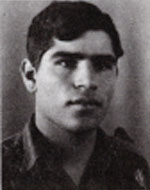Eyal, son of Shoshana and David, was born on August 13, 1954 in Kibbutz Be’eri. He completed his elementary studies at Kibbutz Ksufim and completed his high school studies at the Sha’ar Hanegev school. Eyal grew up as a middle son, between his older sister, Haviva, and his younger brother, Uri, and suffered greatly from his feeling that he was “neither here nor here.” He also suffered from the need to prove himself as good, talented and worthy of attention to his accomplishments. So he closed himself, and only the observer with a discerning eye could see his sensitivity and tenderness. He moved away from wild games, preferring quiet and educated learning games. While he was in the garden he excelled in math and writing. He was careful about spelling it right, for it was very important to him, and he even served as amusement. When he was almost seven years old, he moved with his family to Kibbutz Yiron, where he entered second grade in the last third of his studies. Thus was the youngest of the students, the “Benjamin” of the class. He did not lag behind the rest of the children, either during the trips to get to know the surroundings and not when climbing the mountains, and participated in reciting at parties and plays. He had a rich and fertile imagination, which developed over time. One day he was recorded by a member of the kibbutz, who told him in full detail about his hardships on his way to Israel, through the mountains in northern Iraq, the smugglers he encountered, and all the troubles of immigration to Israel. As mentioned, he was born in Bari, and never went the long way he described, and it was only evidence of his imagination. When the time came to return from Kibbutz Yiron to his kibbutz, a problem arose – in which class was he named? Was it in the class where his older sister, or the class below, where his younger brother had studied? Finally he went to study in Kissufim and Sha’ar Hanegev with his peers. His success and development were a joyous and probably not surprising fact. At last he was given the opportunity to start again, without public opinion, without memories that were “locked” into “cells” of what they expected. Eyal studied his studies, and could explain his opinions in a moderate voice and patiently. He began to be active in arguments and his many friends used to consult him about Hebrew literature and language. He had his own interpretations of phenomena in these fields, and he even wrote poems and rhymes of his own. He persistently studied and developed, and achieved impressive achievements. All the time he had studied outside his kibbutz, Barry, he maintained contact with his group there, though he was friendly and accepted in his new place. His thesis dealt with analyzing the phenomenon of drugs and their use in society. Eyal also had a well-developed musical sense and used to sing. He especially liked sad songs, and he sang most of the day, or he listened to the radio on the radio. He also studied sound development and devoted much interest to this hobby. Eyal was drafted into the IDF at the beginning of November 1972. After completing basic training, he was assigned to a combat unit in a field unit of the Armored Corps, but at first he did not want to be a combat soldier. Eyal never complained about his difficulties, despite the fact that he had a hard time getting over the technical field of using his weapon, and during the Yom Kippur War Eyal participated in battles in the Sinai and often fought to save the lives of his comrades. On October 19, 1973, his armored personnel carrier was hit and set on fire in the area of the missile base in the Giv’at Ze’ev and Jeb hills Um spelling. Eyal was killed and brought to eternal rest in the cemetery at Kibbutz Be’eri. Survived by his parents, three sisters and a brother. After his fall, he was promoted to sergeant. In a letter of condolence to the bereaved family, his commander wrote: “He fulfilled his role faithfully and devotedly, while showing excellent fighting ability and professionalism”His kibbutz published a pamphlet commemorating the names of the farm’s fallen soldiers, and Eyal’s name among them.
